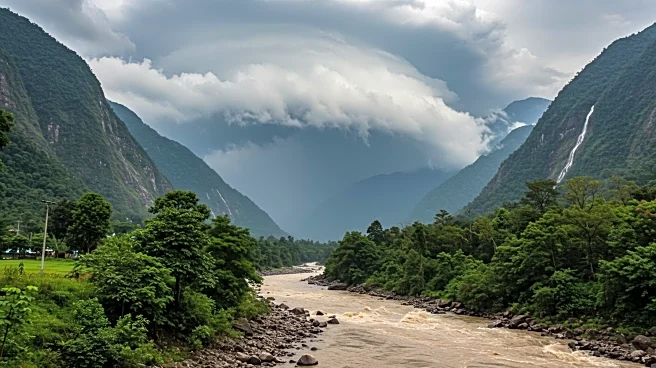What is the story about?
What's Happening?
Heavy monsoon rains in Pakistan have led to devastating flash floods and landslides, resulting in the deaths of at least 194 people over the past 24 hours. The majority of fatalities occurred in the Khyber Pakhtunkhwa province, where disaster authorities reported 180 deaths. The floods have also caused significant destruction, including the loss of 30 homes and the crash of a rescue helicopter, which killed its five crew members. Additional deaths were reported in Pakistan-administered Kashmir and the Gilgit-Baltistan region. The monsoon season, which typically spans from June to September, has been particularly severe this year, with scientists attributing the increased intensity and frequency of weather events to climate change.
Why It's Important?
The severe flooding in Pakistan highlights the growing impact of climate change on weather patterns, leading to more extreme and frequent events. This situation poses significant challenges for disaster management and preparedness in the region, affecting the lives and livelihoods of millions. The destruction of homes and infrastructure further exacerbates the humanitarian crisis, requiring urgent international aid and support. The ongoing monsoon season continues to threaten additional areas, with government forecasters predicting heavy rainfall until August 21. The disaster underscores the need for improved climate resilience and adaptation strategies to mitigate future risks.
What's Next?
As the monsoon season continues, Pakistan faces ongoing threats of further flooding and landslides. Government agencies are likely to intensify rescue and relief operations, focusing on affected regions declared as disaster zones. International aid and support may be mobilized to assist in recovery efforts and provide humanitarian assistance to displaced populations. The situation may prompt discussions on enhancing climate adaptation measures and infrastructure resilience to better withstand future extreme weather events.
Beyond the Headlines
The floods in Pakistan may have long-term implications for regional stability and economic development. The destruction of infrastructure and homes could lead to increased poverty and displacement, affecting social cohesion and economic growth. Additionally, the disaster may influence policy discussions on climate change and environmental protection, potentially leading to increased investment in sustainable practices and technologies.















